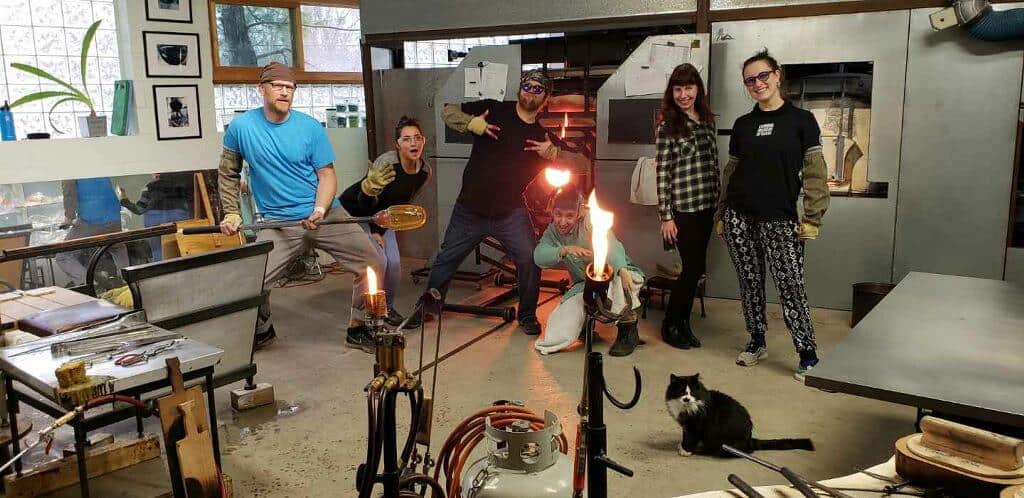
Free shipping on orders in the continental U.S. over $199. Shop Now


With the prices of higher education constantly increasing, it’s extremely important to consider the value of the education you’ll receive. Will you have to take out loans? Are scholarships available? What resources and opportunities can school provide you? These questions become even more important in regards to art school – high cost education in one of the lowest paying fields. In this post, we’ll give you some information to decide for yourself if art school is worth your time and money.
Attending a designated art school or arts program definitely has many benefits. Let’s take a look at some of the many advantages to attending art school.
Both students and faculty – making it a great environment to nurture your creativity. So many different types of creative people attend art school, which gives you great opportunities to meet new people, bounce ideas off of them, collaborate and be inspired.
Art schools employ extremely talented artists that you work directly with and learn from. Before deciding what schools you apply to, you may even want to find out who the top names are and where they’re teaching. Take advantage of the resources you will be given and be sure to build relationships with your instructors. You’ll be given so many opportunities to make connections and network, so be sure to make the most of it.
Art school demands a lot of its students. You’ll take several studio classes at once and have several different projects going. Fortunately, you’ll have access to facilities on campus – glassblowing studios, darkrooms, wood shops, etc. Some schools will even give you access to your own studio once you’ve really delved into your concentration. Not having to worry about access to equipment and materials takes some stress away from the intensity of art school.
Art school is a unique experience in itself. You’ll be exposed to so many new people, ideas and lots and lots of art. It’s a great chance to grow creatively and as a person and you’re sure to come away from it with unforgettable experiences, lifelong connections and a lot of knowledge.
Though art school has many advantages and you’re sure to get a great education, that doesn’t make it a perfect fit for everybody. Here are some of the downsides of art school.
Attending university in general is a huge investment that leaves many graduates in debt. Adding to this, art schools are some of the most expensive schools to attend. A four year-degree at Rhode Island School of Design (a private school) costs $245,816. A degree from Harvard Law school costs $236,100.
That’s not the end of the expenses though – there are a slew of costs in addition to tuition. Art supplies are quite expensive and if you’re taking many studio classes, the costs can add up quickly. During your first few years of school you’ll be required to take foundational courses like 2D or 3D design, color theory and principals of design, drawing and painting. This means you’ll have to buy supplies for classes that you may not need to use again after.
Like traditional universities, you’ll also have to take foundational liberal arts classes in subjects like math, science, and English. These classes usually require textbooks which are known to be extremely pricy and although you can sell them back at the end of the semester, you usually don’t get back anywhere near what you paid.
Finally, add on studio fees, room & board, transportation… To give an idea of these expenses, students at Pratt Institute pay $30,000/year in tuition and another $20,000 in other costs. Art school is a huge investment!
Once you’ve graduated, you’ll need to find a job. Unfortunately, not all schools will teach you how to market yourself as an artist or how to start your own business. There will most likely be a class that teaches you how to make a portfolio and write an artist statement and resume, but they won’t necessarily give you the skills to go out into the world and sell your art. Learning how to present yourself and create a brand are extremely important, especially in the digital age with social media and the over-saturation of artists on these platforms. Taking outside business and marketing courses can be extremely beneficial, but are also another expense.
It isn’t always realistic to make art your career. It’s very competitive and one of the lowest paying fields. It’s possible that you’ll need to take on part or full time work to supplement your artistic endeavors. There’s nothing wrong with this, and you can still pursue your passion, but it can be a frustrating reality that making a career out of art doesn’t guarantee a livable wage. No matter what, a lot of hard work will be required.
Unfortunately, there isn’t a simple answer to this question and it varies from person to person. Art school offers a great education, training, connections and opportunities. If you are going to put your all into art school, take advantage of all the resources offered to you and use your time in school to grow and establish yourself as an artist, then art school could very well be a great investment.
But it’s not the end all be all route to becoming a successful artist.
This article by Noah Bradley lays out an interesting alternative route to traditional art school at a fraction of the price. If you are a self-motivated hard-worker, this could be a great option for you. By making art, taking classes (online or in person), connecting with other artists, and getting yourself and your art out there, you can definitely build yourself up and be successful.
epiphany’s glass artists all come from very different backgrounds. April attended the NYS College of Ceramics at Alfred University and the College for Creative Studies, receiving a Bachelors of Fine Art with an emphasis in glassblowing. But not everyone has to attend college to learn glassblowing.
Marc Vandenberg was attending school for a degree in communications. During this time he purchased a torch and taught himself how to use it. Later he got a job at Greenfield Village working with furnace glass making Old World American glass reproductions. Marc worked in production for 15 years and now works at epiphany as well as out of his own studio located in the Russell Industrial Center in Detroit.
Rebecca Silverman was attending MSU for a degree in education. She started working at a shop near campus that primarily sold locally made glass. After becoming interested in glass as a medium, she asked every glassblower she met to work for trade in their shops, persuading them to let her clean, organize, or do anything necessary to convince them to begin training her in their craft. Since then, she has taken classes at Corning Museum of Glass on multiple occasions and has a flame working studio in her garage at home.
Chris Kramer was first introduced to glassblowing by a friend that was a lamp worker. While attending Salem Community College for a glass arts degree, he took furnace glass course and fell in love with it. He has since worked in glass studios including Greenfield Village and Flint Institute of Arts to further his knowledge and skills.
Just like attending any university, school doesn’t fit everybody and not everybody needs higher education to be highly successful. Either way, what matters is what you put into what you’re doing.
Want to learn more about team epiphany? Check out our bio page.
Follow us on social media to keep up with us.